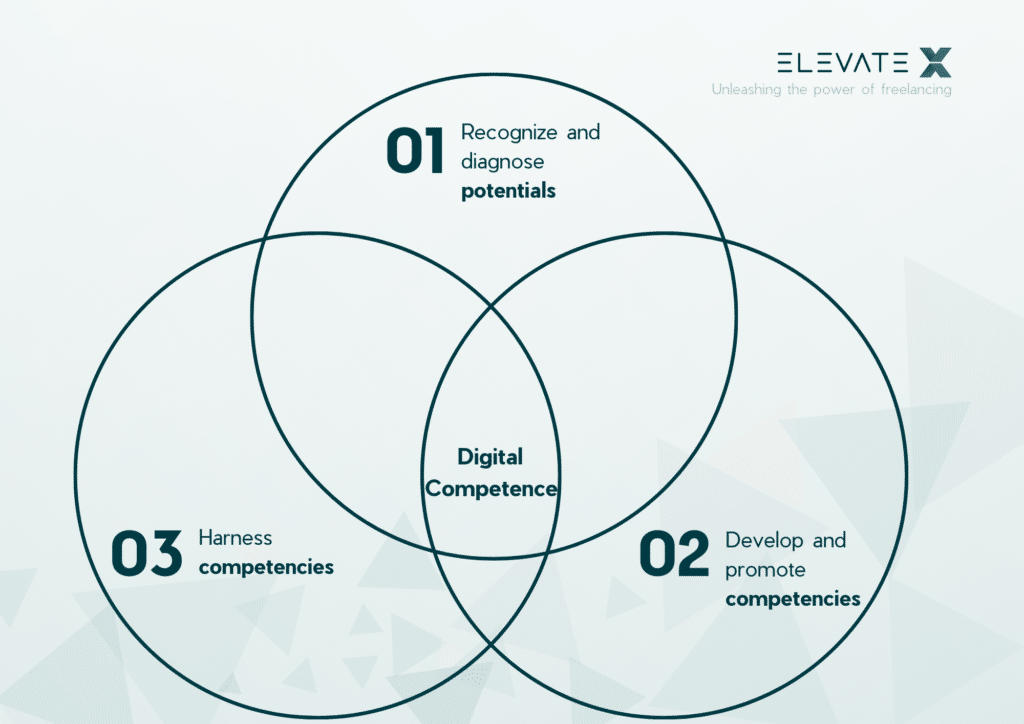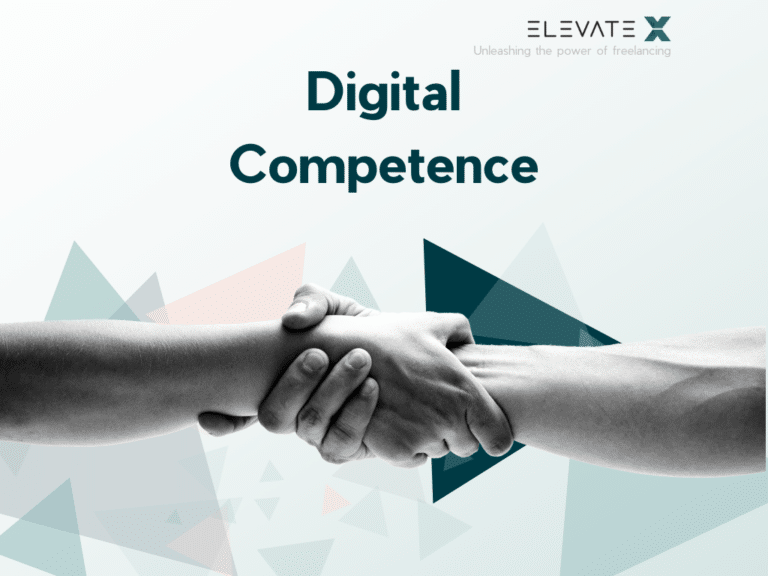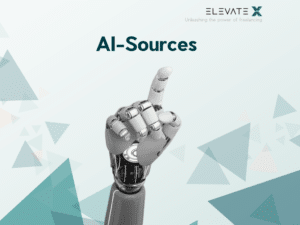Digital competences are of the utmost importance in the age of digitalization. That’s why the European Union included them in the list of key skills to be learned and continuously developed throughout one’s life back in 2006. Even professions not directly related to information technology now regularly interact with digital tools, processes, and strategies. This is reason enough for us to take a closer look at what exactly is meant by digital competence.
What Does Digital Competence Mean?
The broad term encompasses all the skills and knowledge required to navigate the realms of the digital world, communication and information technology, and the use of digital media. At the same time, it’s essential to differentiate it from what’s called “media literacy.” This subfield, falling under digital competence, focuses exclusively on specific media and platforms. It describes how well someone can use digital media, incorporate them into their work, and critically and objectively analyze them.
Digital competence goes a step further. On one hand, it applies to all aspects of life, including both professional and leisure aspects, and, on the other hand, it also encompasses emerging technologies, such as those in Big Data, artificial intelligence, e-commerce, or the cloud. As a result, digital competences are more than just comparing prices on the internet, making an order on your smartphone, or sharing a post on Instagram. A digitally competent person understands the processes taking place in those realms to some extent, at least. The concept of a “Digital Mindset” is also related to this, including the willingness and ability to embrace new aspects of digitalization.
KEY POINTS
- Digital competences are crucial not only in the workplace but also in everyday life and will become increasingly important in both areas.
- Digitalization is changing our private and professional lives, and it also leads to societal changes. Digital competence includes the ability to adapt and keep up with these changes.
- One can break down their competence in digitalization into specific technical competencies and soft skills.
- Digitalization brings more opportunities, increased efficiency, and new or transformed processes, but it should also be viewed critically.
What Are The Most Important Digital Competences?
One example of digital competence is proficiency in a programming language, such as C++ or PHP. However, not being able to program doesn’t mean someone lacks digital competence. Digital competence extends beyond information and communication technology or programming, although they are related.
Employees in companies should possess digital competences, even if they don’t work in the IT department, or at least they should aim to improve their career prospects. Digital education in German schools still has room for improvement. The few hours dedicated to IT subjects according to standard curricula are limited, and it’s expected that the workforce of tomorrow will need to be self-directed in further education and skill development.
This also applies to middle-aged workers: especially they are the ones who should bring a high degree of adaptability as well as the necessary determination to remain in demand on the global and domestic job market, due to changing work and company processes, both internally and externally. According to a survey, a significant portion of employers now assess digital skills at the same or even higher value compared to technical and social competencies.
Soft Skills
Soft skills are complementary to “hard skills.” Hard skills refer to technical and methodological competencies, while soft skills encompass personal values, mentality, character traits, social skills, and resilience.
In the context of digital competence, it includes a person’s agility: their ability to proactively approach problem-solving, their willingness to engage in demanding further education, and their initiative.
Emotional intelligence and social competences are also important, especially for professionals with personnel responsibilities. This involves the challenge of guiding long-standing employees within companies toward digitalization and the use of new tools and instruments.
A critical view of the digital world is also part of digital competence. This includes evaluating sources and their reliability. It also involves competences from the field of cybersecurity, such as the ability to recognize potential online threats and avoid them. This starts with basic rules like not opening email attachments and extends to secure cloud usage. Responsible and conscious use of new digital media is also essential.

Key Skills
Digital technical competence, the so-called “hard skills,” are the counterpart, although there is often an overlap between the two. Of course, a person may have a stronger emphasis on either soft or hard skills.
Some key technical competencies and skills include:
- Knowledge of digital data, from data processing and research to storage and the significance of regular backups.
- Proficiency in using specialized tools (e.g., Salesforce or SAP), digital systems (e-commerce solutions and digital inventory management systems), and communication tools (both internal and external).
- Understanding how to use various software solutions, from basic word processing programs to 3D visualizations and image editing software.
- A general understanding of copyright, licenses, and intellectual property rights in the digital world.
- Sufficient knowledge to protect oneself and the company online and to represent the company responsibly.
Another technical competency is problem-solving in the technical realm. IT support staff often encounter issues that could be resolved with a basic level of digital competence. A digitally competent person doesn’t need to solve every problem independently, especially highly complex ones, but they should have the ability to at least use simple problem-solving methods, even if it’s just restarting the computer.
You can find experts in artificial intelligence with us
Applications And Examples Of Digital Competence
There are plenty of examples of how someone can demonstrate their digital competence for optimization or problem-solving. Taking the previous paragraph as an example, if a technical issue arises, a person could first try to solve it themselves. If that’s not enough, they could demonstrate their digital competence by actively researching solutions or consulting artificial intelligence before resorting to internal or external IT support.
A person working in a company with an online store should also be digitally competent. They should be able to use interfaces between inventory management systems and the e-commerce solution used, including creating new products and processing orders, returns, and other internal processes.
Furthermore, a person doesn’t have to be a mobile app developer to sync various devices and efficiently distribute work processes across them. Effective cloud usage, such as securely accessing data from desktops, smartphones, laptops, and tablets, is another aspect of digital competence.
Even basic knowledge can stand as a representation of digital competence. For example, sharing documents as PDFs rather than Word files or uploading images in optimized file formats like JPG instead of PNG to ensure that webpage loading times aren’t negatively impacted.
Critiques And Issues
In the open, interconnected world of digitalization, there are vulnerabilities. There’s a problem if a significant portion of society is unable to acquire digital competences in their middle or later stages of life and, as a result, become gradually disconnected from career opportunities and private life. There are valid concerns related to privacy, data protection, and the dominance of a few tech giants covering a substantial part of the internet with their services and products.
Even the term “digital competence” can be criticized for its lack of specificity, as it’s so diverse that it can be challenging for HR professionals and project managers to assess whether digital competences exist, or which competencies are needed among the many possibilities.
Conclusion
The world is becoming more digital every day, and there’s no turning back to the old analog world and its processes. This places individual initiative and personal responsibility in focus. Having a healthy level of diverse digital competences is increasingly seen as a requirement for both everyday life and the workplace. At the same time, leaders have a responsibility to guide those who have limited exposure to digitalization. Companies, in particular, are called upon to address the pervasive and intensifying shortage of skilled workers.
Digital competence encompasses all the skills and knowledge required to navigate the digital world, information technology and the use of digital media. It goes beyond the use of media and platforms and also includes the ability to adapt to new technologies.
Digital competencies include both “hard skills” such as knowledge of data processing and special tools as well as “soft skills” such as agility, emotional intelligence and critical thinking. These competencies are not only important in the IT sector, but also in various professions and in everyday life.
Digital competence is demonstrated by the ability to solve technical problems, use interfaces between systems, deal efficiently with digital tools and cloud services, and master basic principles such as secure document sharing. It is relevant in various professional and private situations.








